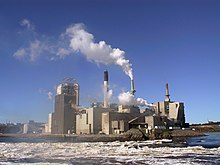| Revision as of 06:39, 29 December 2008 editMyke2020 (talk | contribs)294 editsm added Midland Transport. http://www.moncton4business.com/english/business/article_detail.cfm?id=12← Previous edit | Revision as of 16:27, 4 January 2009 edit undoTew3 (talk | contribs)233 editsm Typo - instryNext edit → | ||
| Line 3: | Line 3: | ||
| JDI traces its roots to a sawmill operated in ] by its namesake, James Dargavel Irving. J.D. Irving's operations were entrusted to his children, one of which, ], assumed majority ownership and used JDI as a springboard for expanding into ] and other forestry-related businesses between the 1920s-1940s. | JDI traces its roots to a sawmill operated in ] by its namesake, James Dargavel Irving. J.D. Irving's operations were entrusted to his children, one of which, ], assumed majority ownership and used JDI as a springboard for expanding into ] and other forestry-related businesses between the 1920s-1940s. | ||
| In the post-] years, JDI took control of pulp mills in Saint John and upstate ], as well as sawmills throughout New Brunswick. During the 1950s, JDI took control of a shipyard in Saint John and started several ] companies and heavy |
In the post-] years, JDI took control of pulp mills in Saint John and upstate ], as well as sawmills throughout New Brunswick. During the 1950s, JDI took control of a shipyard in Saint John and started several ] companies and heavy industry companies like ] to satisfy the growing needs of the company.].]] | ||
| From the 1960s-2000s, JDI expanded to become the largest forestry concern in the ] and northern ] and the region's largest industrial player, with extensive land holdings, tree nurseries, pulp mills (plants producing ] pulp, ]ed paper, tissue products, and ]), sawmills, a retail chain of home improvement stores (]), modular home construction, industrial construction, ], marine towing, dredging, steel fabrication, food services and agri-services (] and ]), railways (]), and manufacturing of personal care products including tissue, diapers and paper towels. In the 1970s and 1980s, JDI expanded into the heavy truck field with its ] subsidiary in DeBert, NS. Now called Midland Transport. | From the 1960s-2000s, JDI expanded to become the largest forestry concern in the ] and northern ] and the region's largest industrial player, with extensive land holdings, tree nurseries, pulp mills (plants producing ] pulp, ]ed paper, tissue products, and ]), sawmills, a retail chain of home improvement stores (]), modular home construction, industrial construction, ], marine towing, dredging, steel fabrication, food services and agri-services (] and ]), railways (]), and manufacturing of personal care products including tissue, diapers and paper towels. In the 1970s and 1980s, JDI expanded into the heavy truck field with its ] subsidiary in DeBert, NS. Now called Midland Transport. | ||
Revision as of 16:27, 4 January 2009

J.D. Irving Limited is a privately owned conglomerate company headquartered in Saint John, New Brunswick, Canada. Its activities include many industries: forestry, paper products, agriculture, food processing, transportation, shipbuilding. The company forms, with Irving Oil, the bulk of the Irving Group of companies, which regroups the interests of the Irving family.
JDI traces its roots to a sawmill operated in Bouctouche, New Brunswick by its namesake, James Dargavel Irving. J.D. Irving's operations were entrusted to his children, one of which, Kenneth Colin Irving, assumed majority ownership and used JDI as a springboard for expanding into pulp and paper and other forestry-related businesses between the 1920s-1940s.
In the post-war years, JDI took control of pulp mills in Saint John and upstate New York, as well as sawmills throughout New Brunswick. During the 1950s, JDI took control of a shipyard in Saint John and started several trucking companies and heavy industry companies like Irving Equipment to satisfy the growing needs of the company.

From the 1960s-2000s, JDI expanded to become the largest forestry concern in the Maritimes and northern Maine and the region's largest industrial player, with extensive land holdings, tree nurseries, pulp mills (plants producing kraft pulp, supercalendered paper, tissue products, and corrugated medium), sawmills, a retail chain of home improvement stores (Kent Building Supplies), modular home construction, industrial construction, wallboard, marine towing, dredging, steel fabrication, food services and agri-services (Cavendish Farms and Cavendish Agri-Services), railways (New Brunswick Southern Railway), and manufacturing of personal care products including tissue, diapers and paper towels. In the 1970s and 1980s, JDI expanded into the heavy truck field with its Scot Truck subsidiary in DeBert, NS. Now called Midland Transport. JDI is also the largest shipbuilder in Canada with ownership of shipyards in Halifax, Pictou, Liverpool, Shelburne, and Georgetown.
External links
This article about a Canadian corporation or company is a stub. You can help Misplaced Pages by expanding it. |